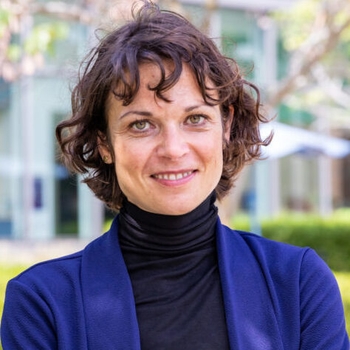
Biomedical engineer and M.D. receives Packard Fellowship to study cellular memory
The unique program awards $875k in flexible funding.

The unique program awards $875k in flexible funding.
BY: DEREK SMITH
Memories of disease could impact human lives down to the cellular level. That’s U-M researcher Claudia Loebel’s idea at least, and it landed her a fellowship from the David and Lucile Packard Foundation.
Loebel is one of 20 early-career researchers who were selected as 2023 Packard Fellows for Science and Engineering, the foundation announced today. The fellows were chosen from 100 nominees for their groundbreaking work and creative approaches.
The fellowship includes $875,000 of discretionary funding over five years to support her research on how chemical signatures of disease can be recorded inside tissues as memories for future generations of cells.
The work aims to advance biology and has the potential to lead to discovery of new ways to treat diseases such as fibrotic, inflammatory, and congenital disorders.
“Professor Loebel’s truly transformative work exemplifies the cross cutting nature of engineering research today. With an MD and a PhD, she applies the principles of materials engineering to biological systems,” said Elizabeth Holm, chair of the Department of Materials Science and Engineering and the Richard F. and Eleanor A. Towner Professor of Engineering.
“This award places her in the rarefied group of Packard Fellows, which includes some of the most creative and influential thinkers in the nation,” Holm added.
As an assistant professor of materials science and engineering, Loebel’s interests lie in the material that surrounds almost every cell in the body – the extracellular matrix. This complex network of biomolecules provides structural support for cells and acts almost like a telephone network, transmitting both harmful and beneficial signals that program cells inside the tissue.
“When you put cells in a certain environment, it can change how their genetic machinery works so that they remember certain things,” said Loebel. “My idea is that this memory is stored not only in cells’ genetics, but in this extracellular matrix.”
If disease strikes or a tissue is injured, cells can secrete chemical messages that alter proteins on the surface of the extracellular matrix. These chemical changes can act like signatures for the other cells to receive, said Loebel. A large number of such protein changes could lead to further changes in the structure and stiffness of the extracellular matrix. Because cells recognize their environment by pushing and pulling on the extracellular matrix, stiffness and structural changes could hamper intercellular communication.
If those structural changes and chemical signatures persist after older cells die, they could linger as memories that are perceived by the next generation of cells, even after the disease subsides. With the funds from her new fellowship, Loebel hopes to better understand what she calls the “data stored in the telephone line” at different stages of disease and how cells sense that data at different stages of their lives.
Loebel’s interest in the extracellular matrix began during her PhD studies at ETH Zürich in Switzerland between 2012 and 2016. At the time, she studied polymers–large chains of molecules–used to rebuild tissues by mimicking the extracellular matrix. As her studies progressed, she read new studies showing how cells interact with the extracellular matrix and how cells encode memories in their genes. Those papers formed the groundwork for her ideas on how the extracellular matrix might store cellular memories too.
Research wasn’t always in Loebel’s crosshairs. First, she wanted to be a clinician and went to medical school at Martin-Luther University Halle-Wittenberg, about a one-and-a-half hour car ride from her hometown of Chemnitz, in the German province of Saxony. The seeds of her career change were sown during her molecular biology research while working on her MD thesis in medical school.
“I just got more excited about being more creative with the questions I was asking, and I knew I needed a PhD to ask the questions I wanted to ask,” said Loebel. “I also realized that I couldn’t give 100% to both clinical medicine and research. That’s what made me decide to do a science career, and biomedical engineering was right at this intersection of my medical interests, my interest in advancing medicine, and also in developing tools that allow us to do that.”
Those sentiments were set in stone during Loebel’s postdoctoral position with Jason Burdick at the University of Pennsylvania. “He made me feel very appreciated. He was just very curious about what I was doing. That was one of the moments where I thought, ‘OK this is where I want to be.’ I wanted to talk to students and give them the feeling of what they are doing is important.”
Teaching students offers something treating patients used to for Loebel — a chance to have a direct, positive influence in other people’s lives.
Although Loebel got her medical degree long after the fall of the Berlin Wall, she still remembers a time during her childhood when her hometown was called Karl-Marx-Stadt during the communist regime. “It was a difficult time,” Loebel recalls. But, her parents overcame that hardship, and Loebel looks to them as an example of how to persevere when times get tough.
“My parents have really shown me how to work hard. They didn’t have the opportunity to go to college, but they worked really hard to give us a good life,” said Loebel. “They always let me decide what I wanted to do and gave me all the support I needed. They’re the people who showed me what it means to work hard and that you can achieve your goals.”
The Packard Fellowships were inspired by David Packard’s passion for science and engineering and his commitment to strengthening university-based science and engineering programs in the United States, according to the Packard Foundation. He recognized that the success of the Hewlett-Packard Company, which he co-founded, was derived in large measure from research and development in university laboratories.